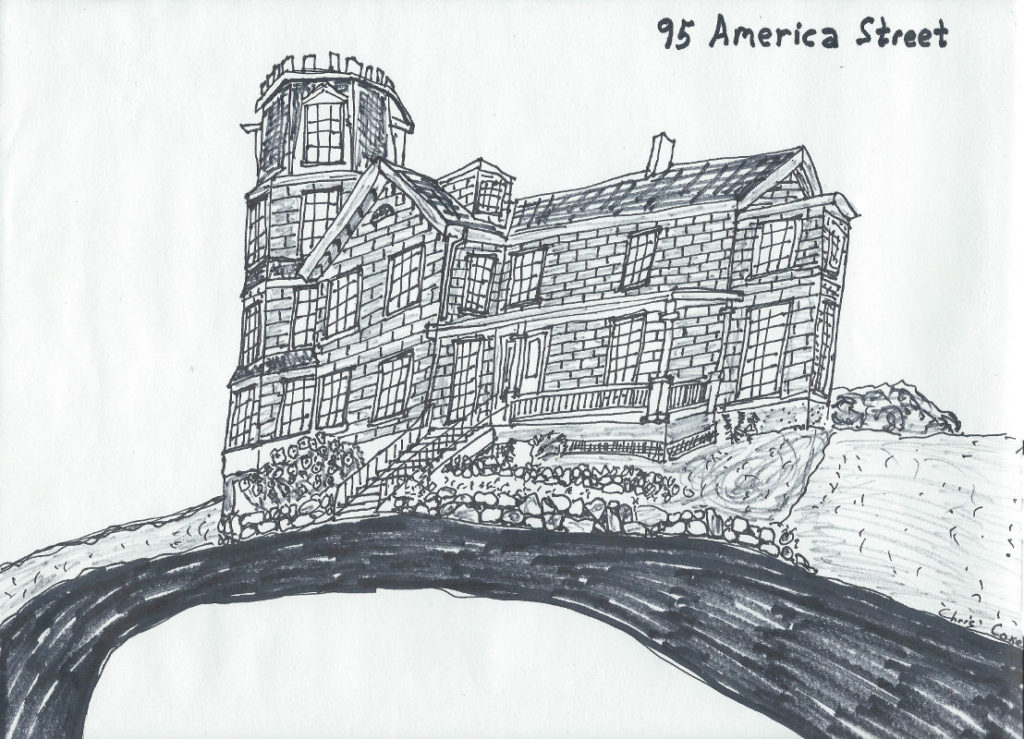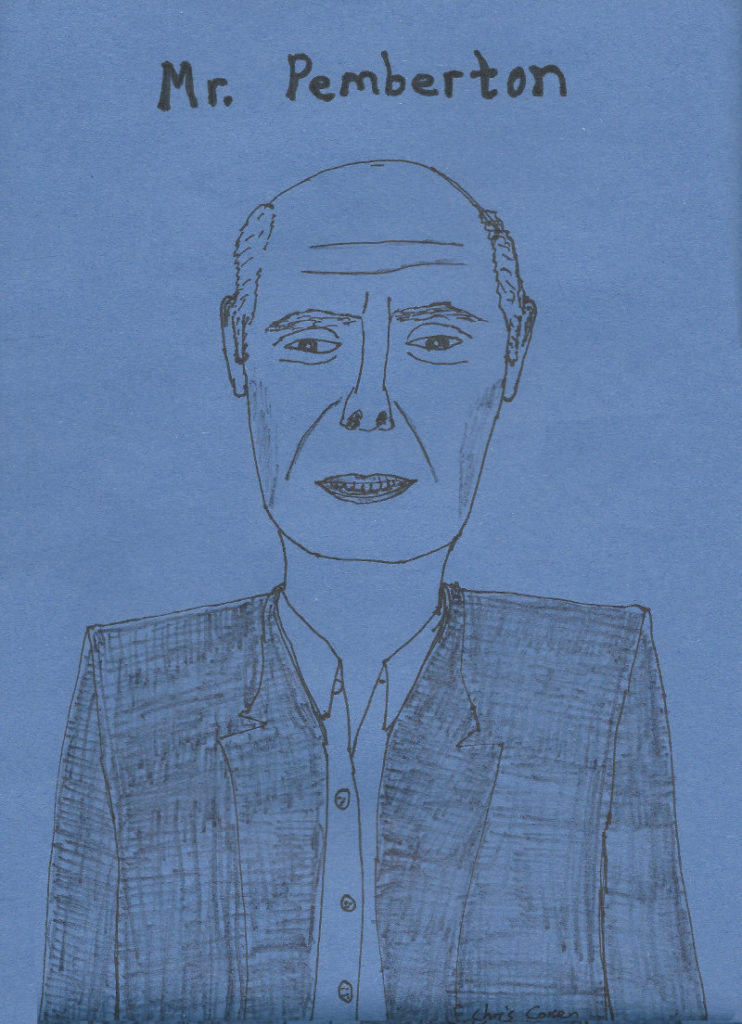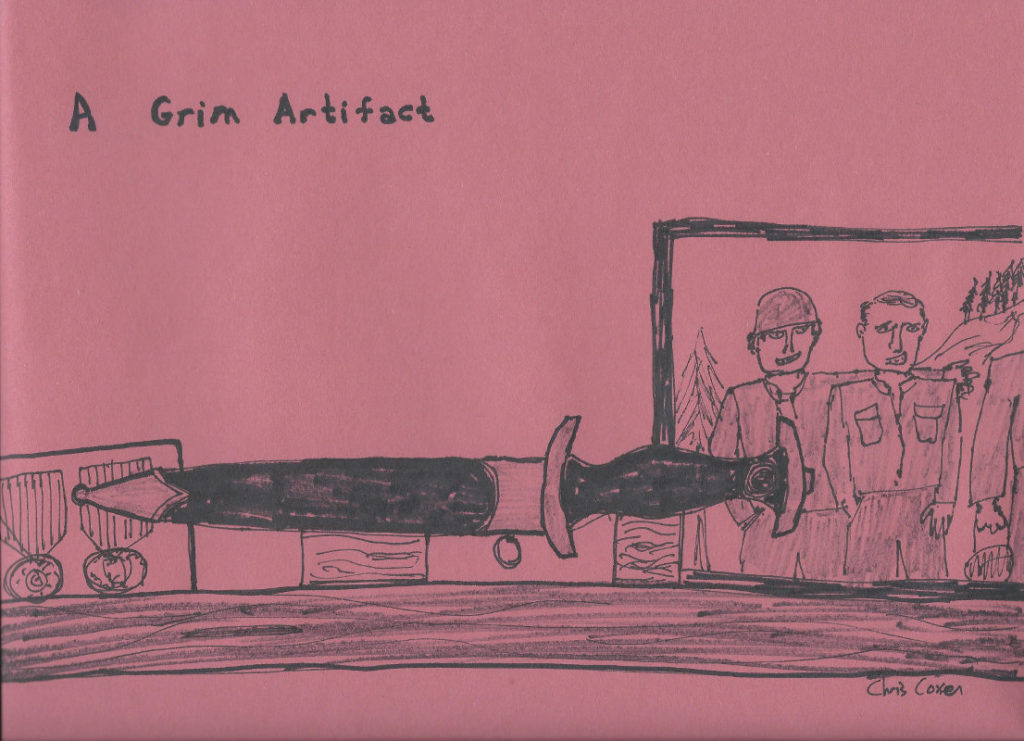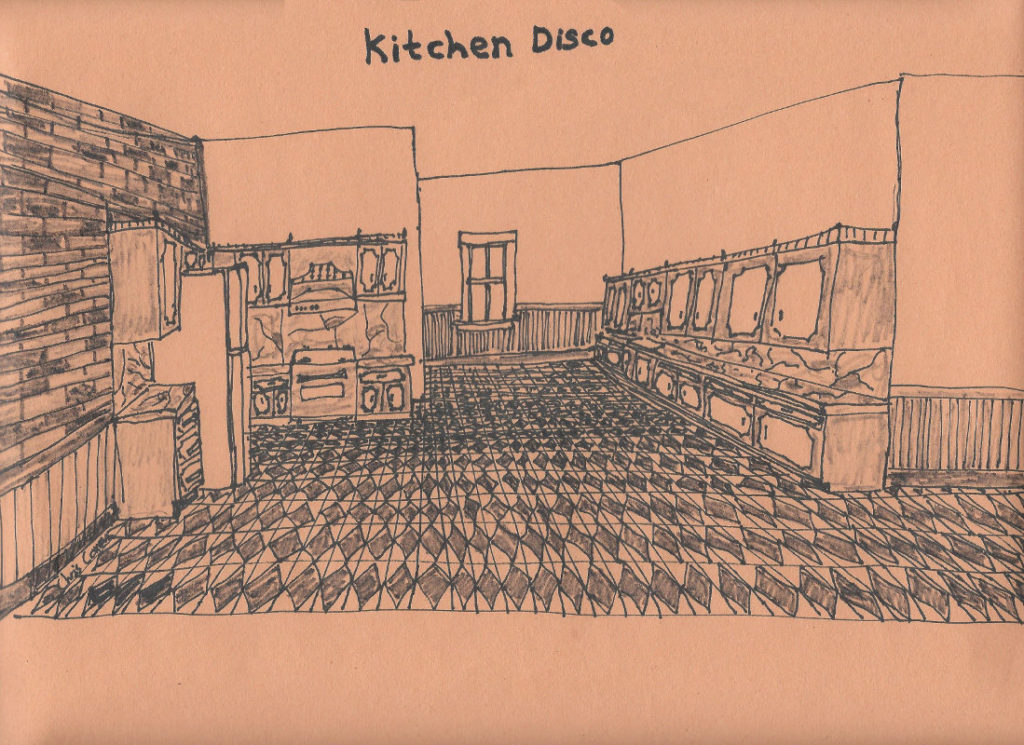Sometimes the incredible happens; the special, the unbelievable, the downright absurd, the very thing that makes you feel like you’re living in a cartoon. But most of the time, it’s not the actual event that happens that makes it these things but rather the people involved. This is how it was at 95 America Street which was really 95 Forest Hills Street but that will be explained later. If you walked into that old Victorian house in the Boston neighborhood of Jamaica Plain, you would find things that would frighten you or bring record-breaking amounts of delight to you. Which one would depend on you. That’s the other thing about the incredible, special, unbelievable, downright absurd, very thing that makes you feel like you’re living in a cartoon: sometimes that which makes it these things has no connection to the thing that happened or the people involved. Sometimes it’s our perception. There were some people that walked into 95 America Street and were immediately uncomfortable. Things were very different here. Even many of the “open minded” residents that one would find in the proudly liberal and diverse neighborhood of Jamaica Plain would find much to gasp about at this address. Others would be able to see past the calamities and the extreme personalities and encounter some sort of Zen.
How you reacted to 95 America Street and its residents was not a product of your political affiliation or whether you smoked pot in college (or still did). Your reaction could not be predicted by your age or whether you like your pants to have pleats or a flat front (often a great indicator of things). No one could find the Trader Joes spinach and kale and Greek yogurt dip in your refrigerator and the Earth Wind and Fire box set in your music collection and know for sure how you might process these lovable maniacs (although they would know you have fine taste in food and music).
For me, by the end, the house reminded me of a case of my favorite Matchbox cars. Simply opening up the case and looking at them was joy in itself. On their own, each car was fine enough but together with the others, the collection was undeniable.

I can only explain the miraculous coming together of everyone as an act of God. Sure, I put in biblical amounts of effort in order to keep this team together. Even our infallible supercomputer, “The Geek” would not have predicted success with this bunch but it was not the contents of their files or resumes that made my decision, it was their underlying sense of positive purpose. With some of them, that purpose was buried a little deeper but with all of them, I could sense that they would ultimately do the right thing, no matter how crazy they seemed.
They also magically balanced out and complimented each other in ways I could have never foreseen. Stever helped Future Queer hone his message. Danny taught Barry the value of being aggressive when the situation called for it. Ripps…well he helped get my bench press to 250 which is impressive given my long, thin arms.
Why were we all living together in this monstrous old house? Simply put, it was a well-funded act of good will. By the spiritual and financial grace of an old man, we were given the chance to help our community in a very real and, often times, cartoonish way. I was given the charge of putting a team together that would help however we could. Our benefactor referred to us as “Just Ambassadors of Good Will” so I made the “Just Ambassadors” into “Jambassadors”. On the surface, as far as the media and local government were concerned, we were a charity composed of do-gooders that simply wanted to make the world a better place by volunteering and helping our common citizen in a diverse collection of legal ways.
Beneath the surface, we were sometimes vigilantes. We tried to avoid violence as much as possible. I continuously instructed everyone to keep the lowest profile possible when engaged in borderline illegal activities. Fortunately, I was friends with certain police officers and officials who, through the years, became more powerful and protected us as much as possible. Most of the police and certain officials quietly loved what we did because we answered to no one and could address a lot of annoying things better off handled with our very direct methods. Most of the incidents we dealt with were smaller and non-lethal in nature so it was a little easier to keep things under the radar. Also, none of us carried guns. That was part of the understanding with my contacts in the Boston Police Department. Once bullets started flying, the BPD’s ability and desire to protect us from scrutiny vanished.
My “career” has been a varied one. I never knew quite what I wanted to do which reflected itself clearly in my peculiar job history that I had achieved by the age of 40. Enjoy:
Customer service rep for an investment company
Sales and account management for a cable company
Mortgage broker
Granite countertop installer
Painter/handyman
Painting and “handymaning”, as I call it, was something I started doing during summer breaks in college. I continued to do it off and on until I was about 31 or so. It actually started as painting and slowly evolved into handymanning over the years. It sounds wonderful; knowing how to do and fix different things but you must keep John Steinbeck’s brilliant and true line from East Of Eden in mind: “Alf was a jack-of-all-trades, carpenter, tinsmith, blacksmith, electrician, plasterer, scissors grinder, and cobbler. Alf could do anything, and as result was a financial failure although he worked all the time.” Okay, so there are a few things on Steinbeck’s list I haven’t done but the idea is valid.
Ironically, if you look at a) working on people’s houses and b) being a charitable vigilante, my approach to both was accidentally but logically similar. I approached the first type of work as a handyman which allowed me to address smaller but nonetheless important tasks that needed to be done quickly but were too small for a contractor. I was often called to fix something with a moment’s notice. I had my truck. I had my tools. It was just me. I was very nimble and could react to jobs very quickly. I had stumbled into a sort of niche and was able to mine out an existence. The second type of work was met with a parallel approach. We would happen upon so many pesky problems that were not really designed for the police although they were assigned to deal with them. The neighbor that constantly has parties late into the night is a good example. You call the police, they show up, they tell your neighbor to be quiet, and the next night the neighbor is breaking your heart again with loudness. That’s where we come in. The police can only do so much. We can only do so much more. And this “much more” more often than not, spills no blood.
Oh, and allow me to warn you right now, one of our team members is a time traveler.
***
I can’t remember who first got me in touch with Thomas Aloysius Pemberton, or TAP as his friends would call him. I once heard that if your initials spell a word, you will be successful in life. This was certainly the case for Mr. Pemberton, as I called him. The other bit of name-driven irony is found in his middle name. I’m not sure if Mr. Pemberton realized it (he probably did) but his middle name has Germanic origins and means “fame and war”. One could make the argument that his “fame” originated from fighting Germans in WWII. Once I got to know him better, I joked with Mr. Pemberton that his middle name sounds like a sneeze. He laughed an old laugh and added, “But it’s great – all I have to do is introduce myself and people bless me.”
He was from Kansas. I don’t know the exact place but I do know that his family farm fell victim to eminent domain when Interstate 70 was built. The farm carried on for some time after the highway came through but they lost about 10% of their land and gained an ugly scar that severed their once pristine plot. And the cattle now had to learn to sleep with the alien sounds of high speed vehicles. Seeing those first few cars drive through what his family still called “our property” instantly put things in perspective for Mr. Pemberton. “Nothing in life is a given, nothing is forever save God, maybe. Be thankful for what you have and know it’s all subject to immediate and unwanted change.”
He used to say that phrase every once in a while, “…save God, maybe.” I got the feeling that the “maybe” didn’t appear until later in his life. The “maybe” showed the cracks in his faith that, over the years and just like the cracks in his house, grew in number. Mr. Pemberton called upon me to fix the cracks in his house but I, unknowingly and inadvertently, help fix the cracks in his faith although we never directly addressed it.
Mr. Pemberton wanted to get his house ready to sell. He didn’t have a set date to put it on the market but he thought he should start with some painting. I remember the first time I saw this house whose nickname was “The Castle”. It was March of 2005. “The Castle” was very imposing. I almost ran away when I saw it. This may seem silly until you take into consideration the possibility of painting this ornate, pain-breathing dragon. The nickname came from the four and a half-story, octagonal-shaped turret that stood guard on the front of the house and rose above the rest of it. Add that height to the small hill the house rested on and you had an awe-inspiring thing that looked like a Victorian space shuttle launch pad.
As I looked up, I could see Mr. Pemberton in the very top room. There were four large windows that allowed one to enjoy a 360-degree view of the surrounding area. Mr. Pemberton seemed to be looking into the wilderness of Franklin Park across the street. He looked down at me and waved and opened up the window.
“I hope you don’t have plans for the next week, that’s how long it’s going to take me to get to the front door!”
I responded with some awkward remark that was mildly funny and bland but something that would not offend. This is how you have to be when you meet a potential customer. There’s that walking on eggshells period that lasts until the customer makes some symbolic gesture that signals the end of it, that he or she trusts you. With Mr. Pemberton, I could feel there would be no eggshell period.
When Mr. Pemberton opened one of the double doors, I noticed that there were actually two sets of identical doors. I guess one set of those doors was meant to be a storm door but unlike today’s anorexic storm doors, these were just as heavy and thick as the pair behind it. He came outside on the front porch and smiled genuinely as he shook my hand with surprising firmness.
Mr. Pemberton was 83. He stood about six feet and was missing most of the hair on top of his head and the hair he did have was white. His voice was easy to listen to: the volume was right, it rarely faltered and it was clear. I could instantly tell he was either well-educated or well-read or both.
Someone once told me that one of Bill Clinton’s greatest talents was to make you feel like you were the only person in the world when he spoke to you, even if you just met him. He could listen to you and take great interest in what you said. This is what Mr. Pemberton had. I don’t know if Bill Clinton’s talent was some political mind trick he mastered in Jedi camp but Mr. Pemberton was authentic in his expression of this special skill. It made me understand how he became so successful. Everyone thinks you have to be some oratory hero that can sell hunger to the hungry in order to rule the world but the power to really listen and make someone feel special is one of the most undervalued skills.
I know it sounds strange but his eyes were a perfect combination of a predator and humble saint. He was thin and unless you asked him to climb a tree or run a 100 meter dash, you might think his body belonged to a younger man. His clothes were not overly new but they were nice. You know how a respectable grandfather dresses at Thanksgiving? That’s how Mr. Pemberton dressed all the time. There were a lot of casual blazers, a lot of earth tones.

And the jazz! There was always good jazz playing which was great because that meant I didn’t have to bring my radio when I worked there. No matter where I was working in the house, he would turn up the music loud enough for me to hear. Even if I was working outside, he would put one of the speakers in an open window if possible.
When I walked in that first day, Dave Brubeck was playing (on vinyl, of course). He could tell I was enjoying the elaborate piano of Mr. Brubeck and spoke.
“Brubeck was on the cover of Time magazine in 1954. He was on tour with Duke Ellington when the issue came out. Ellington was about 55 at the time and had never been on the cover of Time himself. Brubeck was 34 at the time, I believe, he was on the cover of Time. In fact, Ellington was the one who happily brought the copy to Brubeck’s hotel room with a smile on his face. Brubeck felt guilty, supposedly. He thought Ellington was the one who should have been on that cover. There will always be some reason to not accept great honor that you deserve but you must accept it nonetheless. Ellington realized this and so should you.”
That was the first of many lessons that Mr. Pemberton armed me with. He really was like the better part of Proverbs or Ecclesiastes or even an Anglicized version of the Tao. He constantly provided that warm intangible thing that made you feel full of purpose and inspiration and peace; that thing we constantly try to achieve through formal, measurable methods or technology. The more we try for such a thing through unnatural methods, the further it becomes from us. He was not the type (and not just because of his age) to post some beautiful thought on the internet and then walk away. Mr. Pemberton was the type to deliver the beauty at the perfect moment; when you were ready, when you were listening, when you were not distracted. He had such subtle, wonderful skills I didn’t even know existed until I met him.
The Castle was built around 1870. It was an old lady but it still turned heads. I looked around the front hallway we were standing in. It was grand. Although tired and a bit worn with a few cracks and stains, the white Carrera marble on the floor still demanded admiration. The molding around the doors seemed one of a kind. I started to spot some, what I assumed to be, original walnut doorknobs. I stopped and looked into it because that’s what these doorknobs allow you to do. Each one is unique and looks like an infinite galaxy of melted chocolate and caramel. The doorknobs were a fine reflection of the entire house: one of a kind.
We eventually made it into the dining room. The detail in the wood floor was a thing of the past as much of the house was and of course, the owner. Most of it appeared to be light oak but there was an interesting ten-inch border that was a few inches from the wall that wrapped around the outer edges of the floor. The border was made of some darker wood with interesting patterns in it. As with a couple windows in the front of the house, the dining room had one or two odd windows that were as big and tall as a door, going all the way to the floor. I’m not sure of the purpose of these windows. You couldn’t use them as doors even though at first glance, they looked like doors. If I had been drinking and heard the ice cream truck outside, I might have gotten excited and ran right through the window, thinking it was a door. I guess there were no ice cream trucks in 1870.
I excused myself to the bathroom nearby and upon entering; I noticed another peculiar thing on the left hand wall. Someone had very neatly cut a rectangular hole in the wall and covered it with glass. It appeared as if someone had intended to showcase this hole in the wall.
“I never knew the inside of a wall could be so interesting,” I remarked after leaving the bathroom.
“Yes, why waste money on paintings when all you have to do is put a hole in the wall? Someone before me did that in efforts to dazzle future generations with the intricacies of Victorian wall construction. It’s amazing how even the dullest, most mundane thing can become mildly interesting if enough time passes. It’s just a matter of time before this trend catches on and we start seeing wall museums popping up everywhere.”
He had definitely used those lines before but I didn’t care. I still found them funny.
For the next 30 minutes, Mr. Pemberton showed me the various projects he had in mind and then left me alone to go back through the various areas one more time. In one room I found a lot of World War II memorabilia. From what I could tell, Mr. Pemberton was a Lieutenant in the Army during that time. In a central position among the memorabilia was a black dagger in a black metal sheath. I stepped closer and noticed a Nazi symbol on the sheath. Although it sent something worse than chills down my spine, I was tempted to hold the weapon and inspect it further. Fearing my body and soul might download some horrific curse, I decided not to touch this grim artifact. Why was it here? What was Mr. Pemberton’s connection to its original owner? It seemed so out of place with everything else not just in that room but in Mr. Pemberton’s life.

I came down the back stairway cringing at a few missing balusters I knew I would have to somehow replace. I had never replaced balusters before. I guess I would have to figure it out and hope it didn’t take too long. After my tiny, internal freak out had run its course, I entered the kitchen and found Mr. Pemberton making some tea. He didn’t ask me if I wanted any. He simply handed me a cup. He must have figured if I made it this far, I was somebody that liked to drink tea. He was right.
The dagger was still on my mind.
“What’s wrong? You look like you saw a ghost. We do have a few lingering around; can’t get the bastards to pay any rent.” He handed me a tea that already had honey in it. Damn, this old guy was reading me like a book on all fronts.
“Oh nothing…I guess it’s just those missing balusters in your stair rails. You didn’t mention them but I know at some point I’ll be asked to fix them. I’ve never…”
“You’ll figure it out.” He said this with the smallest of smiles. I was sure he knew what really gave me the ghost-look. “So what do you think of my modern kitchen.”
My preoccupied mind had not yet taken it in but now that he brought my attention to it, I was glad my stomach was empty. It’s not that it was dirty but so many other things: the ghastly-patterned linoleum floor that was curling up at the edges; the Formica countertops with a nightmarish light blue, orange-pink faux marble pattern that climbed the back walls to meet the next offender; the dark brown cabinets that also did not escape the treacherous curse of Formica, for their particle board core were completely suffocating in a faux…I don’t know what the hell kind of wood was being mimicked here; the brown, metal appliances that were masterfully coordinated with the cabinets (except the refrigerator – that looked like it had entered this hell 15 years ago).
“I, uh…” I struggled to be nice and simply gave up. “Well this kitchen must be the ghost you were talking about. You know, I hear they’re filming a lot of movies in Boston. I’m sure there’s some director out there looking for an authentic 70’s kitchen to film in.”
He bent over slightly and a few drops of tea came out of his mug as he laughed, “HA!!! Wonderful! I’m going to use those lines, if you don’t mind!”
“Of course not,” I said. “Believe me, I tried to find something nice to say. You know, you do have a lot of natural light in here, especially in the afternoon and there is a lot of warm brick and a lot of open space. I have a good friend I work with that does granite countertops, we could find a good cabinet guy, I know a fair plumber and a good electrician. You could keep the layout the same, keep things basic to keep the costs down. You could turn this kitchen disco into a modern wonder.”
“Kitchen disco! I’m taking that one too!” He recovered from his laughter and pondered what I said. As he looked around, he seemed to be quickly seeing moments from the past that were tied to this kitchen. He was clearly not ready to let this old lady go. ”I think there’s still a shred of glory left in this fine galley.” Then he looked right at me and said, “Perhaps the next person that lives here can deal with it.”

As we walked to the front door, I went through the work in my head. Most of it was painting but there was also a fair amount of wallpaper removal. The fact I accepted the job is a testament to how much I admired this man. When I see that much wallpaper removal, I do everything I can to squirm my way out of the job. I’ve even taken a vacation for the hell of it so I had an excuse for not being able to do a wallpaper removal job. If you’re ever doing research on what it feels like to be so depressed, death is the doorway you look to walk through, I say to you: remove lots of wallpaper. It feels like some form of punishment that is so wicked that even the Russians turned it down and decided to send people to labor camps in Siberia instead. But something that day told me Mr. Pemberton would make a good customer and even a better friend, worth the pains of wallpaper removal.
As we stepped outside, he inhaled the unusually warm March air as if he were about to hold his breath under water. He exhaled and held his arms out as if he were an Italian restaurant owner about to hug his favorite customer. “God I love the first warm day of the year. No matter how old I get or rickety I feel, it makes me feel like I’m ten years old. New Englanders love to complain about the winter but to me, this moment is the payoff. It makes it all worth it.”
I told Mr. Pemberton I would be in touch about the work and left him standing on his porch, enjoying the very moment he was in. What a rare thing.
